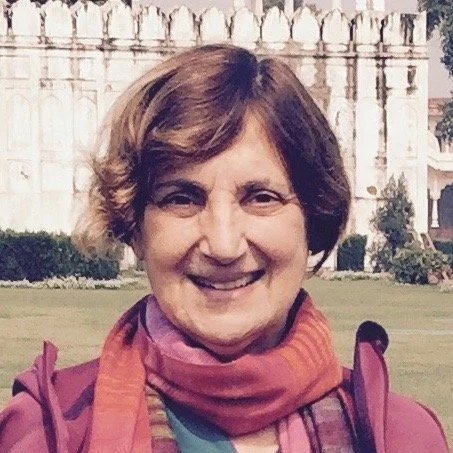Gabriella Brand
Muelama
—to Naomi Shihab Nye
I could meet you at the airport gate,
me with the wispy hair, the pale cheeks.
I would sit next to you, with your thick- braided,
sun-drenched generosity, and together
we’d eat those mamool cookies,
let the snow of powdered sugar
dust our laps.
Or yet again, I could meet you in the desert,
at a lush green oasis,
where my thin, stingy wafer of a heart
would plump up and burst from borrowed kindness.
Or we could meet in the city, at the vacant lot,
where you would show me
how to scratch the earth, pull cakes from the rubble,
sift for something sweet, like hope.
____
Statement of Homage
The world needs people who can see over the walls of their own culture. Naomi Shihab Nye is one of those people. Straddling both her Palestinian heritage and her American roots, Naomi Shihab Nye writes with compassion about all things human. Her poetry is never didactic, always personal. We might read of her grandmother on the West Bank, a universal grandmother, grounded in tender details. But, at the same time, we’re never far from the big questions: how to live, how to treat other people, how to create harmony in a broken world. In honor of Naomi Shihab Nye, I’ve written the poem “Muelama,” which means teacher in Arabic. Those of us who are hybrids or bilinguals, multi-culturals or dual citizens are fortunate when we find someone with whom we can share the journey. For me, Naomi Shihab Nye is one of those people. My poem imagines a face to face meeting, using the circumstances of two of her poems “Blood” and “Wandering Around an Albuquerque Airport Terminal.”
Naomi Shihab Nye
Born in 1952 in St. Louis, Missouri, Naomi Shihab Nye was the daughter of a Palestinian refugee father and an American mother. At fourteen, she lived for almost a year on the West Bank, then returned to San Antonio, Texas, where she finished high school and graduated from Trinity University. She still lives in San Antonio and teaches at Texas State University. Some of her most recent releases include the poetry collections Cast Away: Poems for Our Time (Greenwillow Books, 2020), The Tiny Journalist (BOA Editions, 2019), and Voices in the Air: Poems for Listeners (Greenwillow Books, 2018).
____
Gabriella Brand’s short stories, poetry, and essays appear in over fifty literary publications. Her travel writing can be found in The Globe and Mail and The Christian Science Monitor. She is a Pushcart Prize nominee and serves as the Poet Laureate of her Connecticut town. She teaches in the OLLI program at the University of Connecticut.

